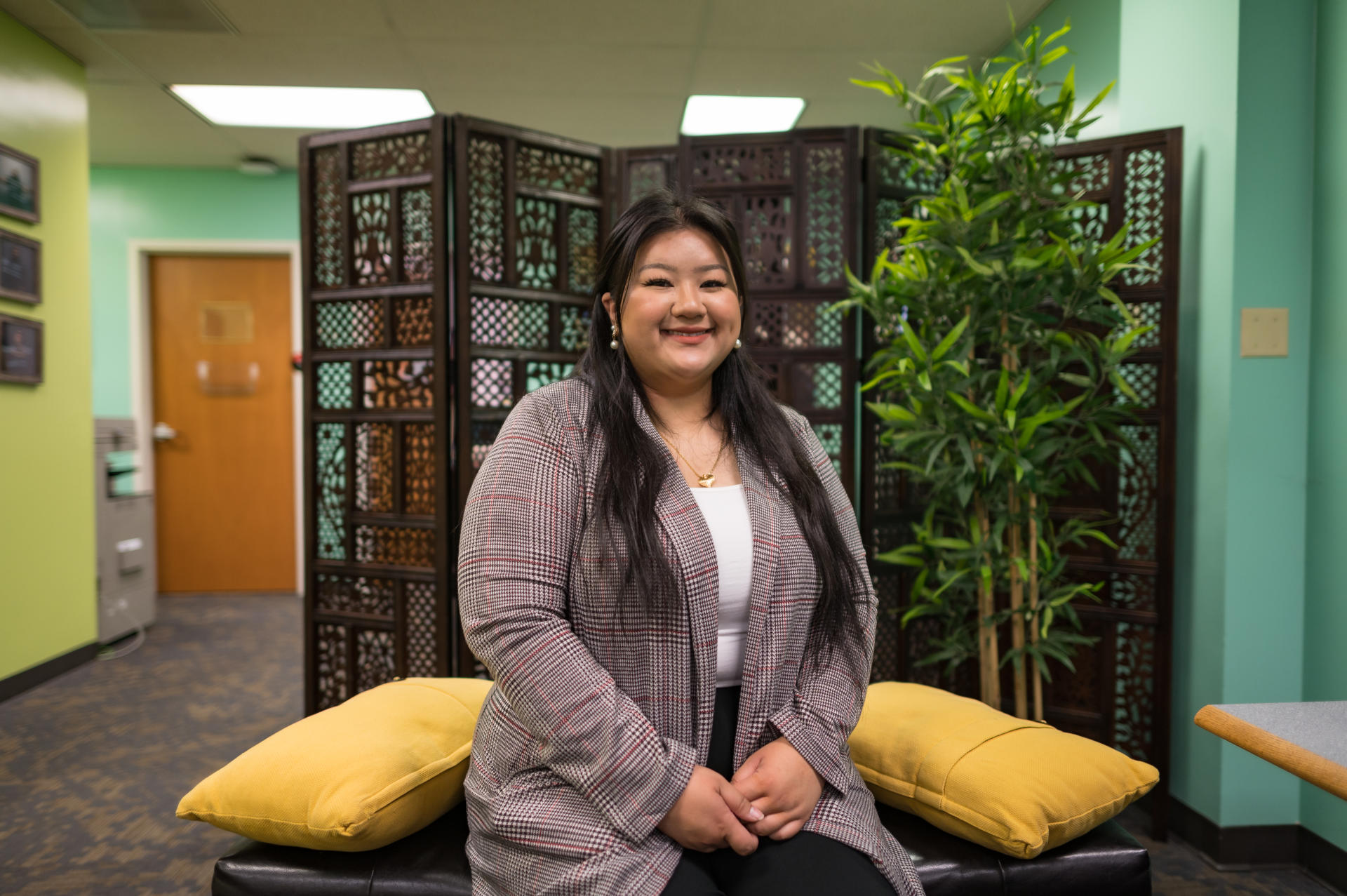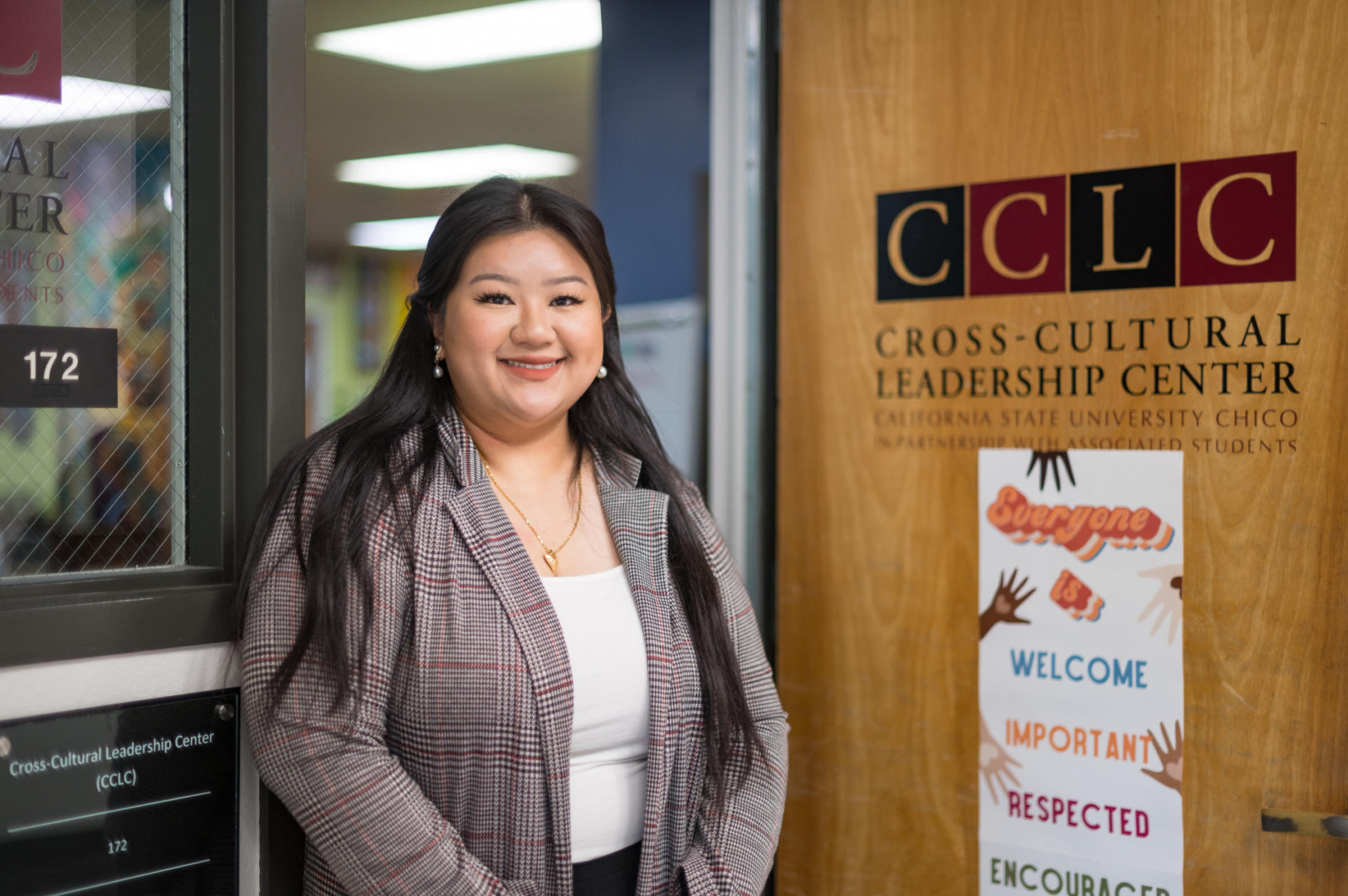Social Work Major Explores Students’ Sense of Belonging on Campus

Selena Thao (center) works at the Cross-Cultural Leadership Center (CCLC) on Monday, April 25, 2022 in Chico, Calif. Thao will graduate with her Bachelor of Social Work degree and two minors in Multicultural Gender Studies and Gender and Sexualities Studies. Through the Cross-Cultural Leadership Center (CCLC), Selena has always worked towards bettering the lives of historically underrepresented students on Chico State’s campus. Selena is a lead paraprofessional at the CCLC, where she runs a Hmong student cultural group. She was selected for a HEERF grant which focuses on understanding BIPOC students’ sense of belonging at Chico State. (Jason Halley/University Photographer/Chico State)
As a first-generation student, Selena Thao had struggled to find her purpose but knew she wanted to make a difference—for herself and those around her.
Part of a traditional Hmong family, the Oroville native and first-generation student is the youngest of five siblings and the only daughter. Abiding by traditional family norms and raised with an expectation “to be silent, obedient, and left out of making family decisions” was not how she wished to live her life.
“I wanted to break free from the patriarchy and to break those intergenerational traumas that were happening in my family,” Thao said. “I didn’t want to be a typical obedient daughter who listened to what her parents said—I wanted to step out and really understand why the things that are happening in my life are happening.”
In her fifth semester at Chico State, she found what she was looking for. Sitting in lecturer Dawn Carini’s “Social Welfare Institutions” class, Thao remembers being struck by how institutions and systems can oppress communities through policies and regulations and, perhaps more importantly, that social workers can help as agents of change.
“It just sparked something in me that I’d never felt before,” she said. “When you take courses you’re very interested in, it opens this little pathway and captures all of your attention—that’s how I felt about social work.”
Having discovered her passion, Thao dove headlong into her coursework, professional development, and serving her University community. This May, she will graduate with her bachelor’s degree in social work, as well as two minors: multicultural and gender studies (MCGS), and gender and sexualities studies.
During her time at Chico State, Thao sought to explore her many intersectional identities: her family’s first and only daughter to attend college, while also being Hmong, a woman, and a feminist. Thao doggedly pursued more knowledge, joining the Hmong Student Association and was mentored by then-president Jer Xiong to push herself by getting more involved with campus life, joining clubs and organizations, attending workshops (like Student Life and Leadership’s Adulting 101 series), and expanding her friend network.
“When I came in as a freshman, Jer emphasized that there was more to life than just coming to school and going home, especially as young Hmong students,” she said. “Jer knew how challenging navigating through the diaspora of being Hmong and being American could be, and she knew that getting involved with campus life would help students with their own diaspora.”
With that in mind, Thao credits her MCGS classes in helping her dive deeper into identities, identity theories, and how those have been historically expressed in US society.
“MCGS gave me the opportunity to explore my American identity and what it meant to be Asian American—because being Asian American was different from being Hmong American,” she said.
Thao also participated in “Hmong Legacy: My Culture, My Story,” an eight-week program designed to help Hmong students explore their identity, build community, and connect with Hmong peers and staff. Students participated in interactive activities, read literature from Hmong authors, discussed topics related to being Hmong, and reflected and wrote about their personal experiences as Hmong or Hmong-Americans. Challenging herself to think critically about what it meant to be a Hmong woman in America, Thao’s picture of who she is came into sharper focus.
“The clarity about who you are comes as you dive in deeper with your identities and the more you’re willing to challenge your comfort zone and personal growth,” she said. “Once I understood my position, my story, and my power, I was able to navigate through my identities and also recognize that breaking intergenerational trauma begins with me.”
Thao still craved more. A visit to the Cross-Cultural Leadership Center (CCLC) introduced her to additional diversities of thought, people, and identities. And attending a Diversity Summit—highlighted by an inspiring discussion from then-director Krystle Tonga (Sociology, Political Science, ’11)—further invigorated her drive for self-discovery, self-advocacy, and empowering others.

“It was a glass-shattering moment of, ‘Selena, this is who you are and this is how your identities are impacted by society,’” she said. “That was my first step into advocacy and learning about what transformational leadership looks like.”
For her senior year, Thao set an intention to lead more justice work across campus and help build a lasting impact for historically underrepresented students. By embracing a social work opportunity among her peers, she differentiated herself as someone who would make a difference.
“She’s got the organizer heart, which really is the foundation of social work and how social workers started,” said social work assistant professor Molly Calhoun, who met Thao in fall 2021 in her year-long “Field Practicum” course.
Thao embodies infectious energy, strong empathy, and a justice approach to engaging with others via inclusive language, Calhoun said.
“I’ve been able to watch her become who she really is and find herself through this work,” she said. “From there, she is supporting her peers and figuring out where they fit.”
Currently working as a lead paraprofessional in the CCLC, Thao also runs a Hmong student cultural group, and this month she facilitated a CCLC leadership retreat. Additionally, she volunteered to help lecturer Judy Vang on curriculum redesign and provide critical feedback to the equity, diversity, and inclusion questions on an annual survey.
And with her passion for inclusion, Thao recently finished a research project with social work faculty Molly Heck. Backed by a Higher Education Emergency Relief Fund (HEERF) award, Thao’s research explores ways in which Chico State students of color experience a sense of belonging.
“Ultimately, she’s listening to the voices of students,” Calhoun said. “What will come out of that is that the campus will understand how we can better support students who are underrepresented and the students that the CCLC serves.”
Thao and Heck shared their findings and recommendations for policy and practice last month at the College of Behavioral and Social Sciences Symposium and with sociology and multicultural and gender studies faculty Nandi Crosby’s “Senior Seminar” class.
Pursuing policy is precisely where Thao sees herself following graduation—working on a macro level and seeking the bigger picture.
“I want to work with laws, policies, and regulations,” she said. “I want to do the grunt work of knocking on people’s doors for nonprofit organizations or grassroots organizing.”
For Thao, this would be the ideal way to continue the work she started at Chico State.
“I feel like a lot of students are really just young kids, navigating through their young lives without really seeing the support they need and seeing the changes they want to see in the world,” she said. “For me, this is the best way that I can give back to my community.”


